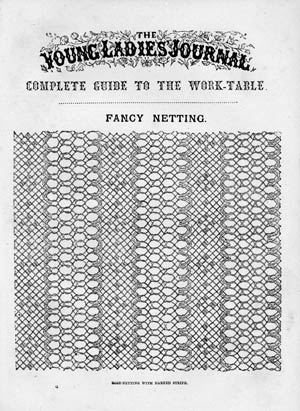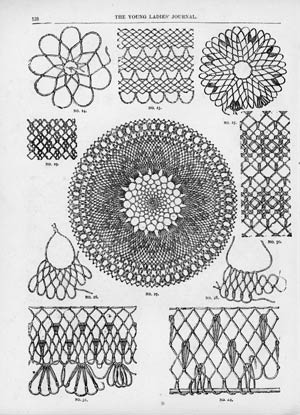![]()
NOTES ON ISSUE 7: GLOSSARY
The bank had foreclosed
a mortgage effected on the property thus pleasantly situated by one of the Coketown
magnates, who, in his determination to make a shorter cut than usual to an enormous
fortune, overspeculated himself by about two hundred thousand pounds. These
accidents did sometimes happen in the best regulated families of Coketown, but
the bankrupts had no connection whatever with the improvident classes.
In the nineteenth century, bankruptcy protection was afforded only to tradesmen.
Others who failed financially were called “insolvent debtors” and could be imprisoned
for their debts.
“the engravings of a man shaving himself in a boot,
on the blacking bottles that I was overjoyed to use in cleaning boots with”
Pictures of a man shaving on bottles of boot-blacking were meant to indicate
that the polish yielded a mirrorlike finish. The reference to these pictures
from bottles of blacking alludes to Dickens's history of working as a child
in pasting printed labels on bottles in Warren's blacking factory.
“Went to Westminster School as a King's Scholar”
The Westminster School, established by Henry VIII in the sixteenth century,
offered King's Scholars free tuition and board. The scholarships were awarded
based on oral examinations. A few places were reserved for Westminster boys
at Oxford and Cambridge, and boys from this prestigious school generally went
on to success.
sleeping in market-baskets
Homeless children in Covent Garden market in London were seen to sleep in the
market baskets; the scene is described by Dickens in The Uncommercial Traveler
as well as in an earlier article in Household Words.
used to act in Latin, in the Westminster School
plays
Royalty and other dignitaries attended the Westminster School plays, performed
in Latin. The plays were a centuries-old tradition that lasted into the twentieth
century. The Illustrated London News often included coverage of the yearly
play; this illustration is taken from the issue of January 1, 1848:
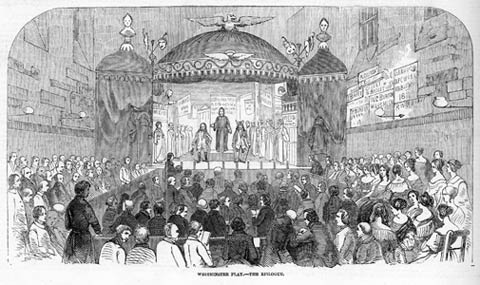
up a narrow dark back street in Antwerp
Bankrupts and debtors from England often moved to the
Continent, where they could find cheap lodgings and freedom from social censure.
red tape
Government papers and legal documents were once bound
with a reddish tape. Thomas Carlyle—to whom Dickens dedicated Hard Times
when it appeared in its first volume edition—popularized the term to denote
excessive bureaucratic regulations.
"In the little safe in young Tom's closet, the safe
used for petty purposes, there was a hundred and fifty odd pound." "A hundred
and fifty-four, seven, one," said Bitzer.
Bitzer's clarification reveals that the safe contained
exactly 154 pounds, seven shillings, and a penny before the robbery. Before
the British monetary system was decimalized in 1971, there were 20 shillings
to the pound and twelve pence to the shilling. It is difficult to make exact
comparisons of value between past and present currencies, as the factors that
affected cost of living were so different, but recall that Mrs. Sparsit's annual
salary was £100. Many male workers, with families, made about £1 per week. Thus,
£154, 7s., 1d. is a relatively substantial sum.
The money would have been kept in a safe that might have looked similar to this
depiction of a patent fireproof safe made by Chubb, a new design that was shown
at the Great Exhibition of 1851. This illustration appeared in the Illustrated
London News on July 26, 1851; note the legend "Bankers Safe" on the door.
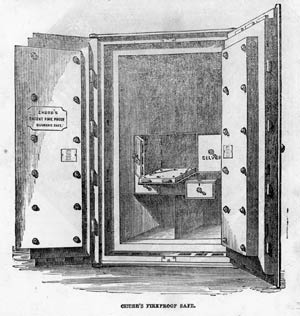
Dutch clocks
Inexpensive German clocks, made in the Black Forest region,
were popular in middle- and lower-class British homes. ("Dutch" was a corruption
of "Deutsch.") They made a loud sound before they struck the hour, which Mrs.
Sparsit refers to here. This picture of such a clock is taken from The Dictionary
of Daily Wants:

floor the Established Church
The Church of England was the state church and was therefore
referred to as the Established Church; Mr. Bounderby implies that Stephen Blackpool,
in seeking a divorce, sought also to divorce church and state. As the nineteenth
century went on, the establishment of the Church became controversial.
Mr. Bounderby, like an Oriental dancer, put his
tambourine on his head.
Dancers in the Oriental style raised up their tambourines
to signify the end of a performance.
on the mangle in the laundry
A mangle was a hand-operated machine used to dry and
press items after washing. Mrs. Beeton's Book of Household Management
includes this illustration of a mangle:
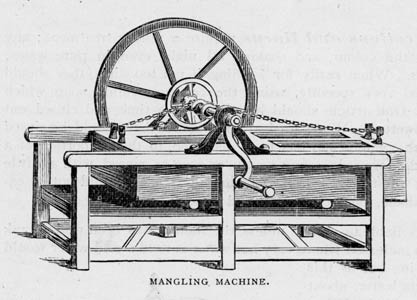
"not your sherry warm, with lemon-peel
and nutmeg"
This combination was a popular Victorian drink, known
as negus.
she arose, put on a loose robe, and went out of
her room in the dark and up the staircase to her brother's room
Louisa and Bounderby apparently have separate rooms.
This was not uncommon for well-to-do Victorian couples.
